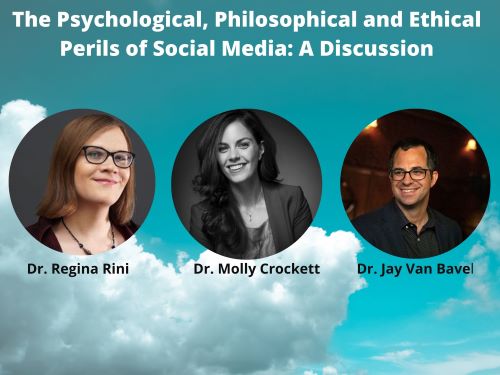AI & Ethics
The Psychological, Philosophical and Ethical Perils of Social Media: A Discussion

DATE: Wed, December 9, 2020 - 10:00 am
LOCATION: Please register to receive the Zoom link
DETAILS
Please register for this event here.
Dr. Regina Rini Bio:
Regina Rini holds the Canada Research Chair in Philosophy of Moral and Social Cognition and is Associate Professor in the Department of Philosophy at York University. She studies how social norms should be negotiated in democratic societies, particularly in response to technological change. Her work has appeared in the New York Times and Los Angeles Times and she writes the regular ‘Morals of the Story’ column for the Times Literary Supplement. Her recent book is The Ethics of Microaggression, and she is currently writing a book about the effects of social media on democratic society.
Dr. Molly Crockett Bio
Dr Molly Crockett is an Assistant Professor of Psychology at Yale University and a Distinguished Research Fellow at the Oxford Centre for Neuroethics. Prior to joining Yale, Dr Crockett was a faculty member at the University of Oxford's Department of Experimental Psychology and a Fellow of Jesus College. She holds a BSc in Psychobiology from UCLA and a PhD in Experimental Psychology from the University of Cambridge, and completed a Wellcome Trust Postdoctoral Fellowship with economists and neuroscientists at the University of Zürich and University College London.
Dr. Jay Van Bavel Bio:
Jay Van Bavel is an Associate Professor of Psychology & Neural Science at New York University, an affiliate at the Stern School of Business in Management and Organizations, and Director of the Social Identity & Morality Lab. He completed his PhD at the University of Toronto and a postdoctoral fellowship at The Ohio State University before joining the faculty at NYU in 2010. He received the NYU Golden Dozen Teaching Award for teaching courses on Social Psychology, Social Neuroscience, Attitudes and Evaluation, Intergroup Relations, Group Identity, Moral Psychology, Professional Development, as well as an Introduction to Psychology.
From neurons to social networks, Jay’s research examines how collective concerns—group identities, moral values, and political beliefs—shape the mind, brain, and behavior. This work addresses issues of group identity, social motivation, cooperation, implicit bias, moral judgment and decision-making, and group regulation from a social neuroscience perspective. His research team studies these issues using a social neuroscience approach, that incorporates neuroimaging, lesion patients, social cognitive tasks, cross-cultural surveys, and linguistic analysis of social media posts. He has a forthcoming book (with Dominic Packer) on the power of social identity.
Jay has published over 100 academic publications and written research essays in The New York Times, BBC, Scientific American, Wall Street Journal, Quartz, and the Washington Post. He also co-authors a mentoring column, entitled Letters to Young Scientists, for Science Magazine. His work has appeared in academic papers as well as in the US Supreme Court and Senate. He has also given talks at dozens of the Psychology Departments and Business Schools, as well as academic conferences, professional events, and non-academic organizations. His research was also featured in TEDx and TED-Ed videos and he has consulted with the United Nations, European Union, and World Health Organization on issues related to his research.
This research has received several awards, including the Young Investigator Award for distinguished contributions in social neuroscience from the Society for Social Neuroscience, the Young Scholars Award for outstanding achievements in social and personality psychology from the Foundation for Personality and Social Psychology, the Janet T. Spence Award for Transformative Early Career Contributions from the Association for Psychological Science, the F.J. McGuigan Early Career Investigator Prize from the American Psychological Foundation, the Gordon Allport Intergroup Relations Prize and the SPSP Wegner Theoretical Innovation Prize.
Jay’s work has been generously supported by the National Science Foundation, Russell Sage Foundation, American Psychological Foundation, Society for Personality and Social Psychology, Social Sciences and Humanities Research Council, John Templeton Foundation, Society for the Psychological Study of Social Issues, AE Foundation, and New York University, as well as grants and fellowships awarded to his students and postdocs. His current grant explores the structure and impact of intellectual humility.
Please register for this event here.